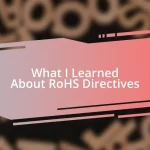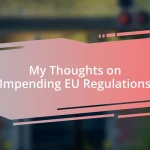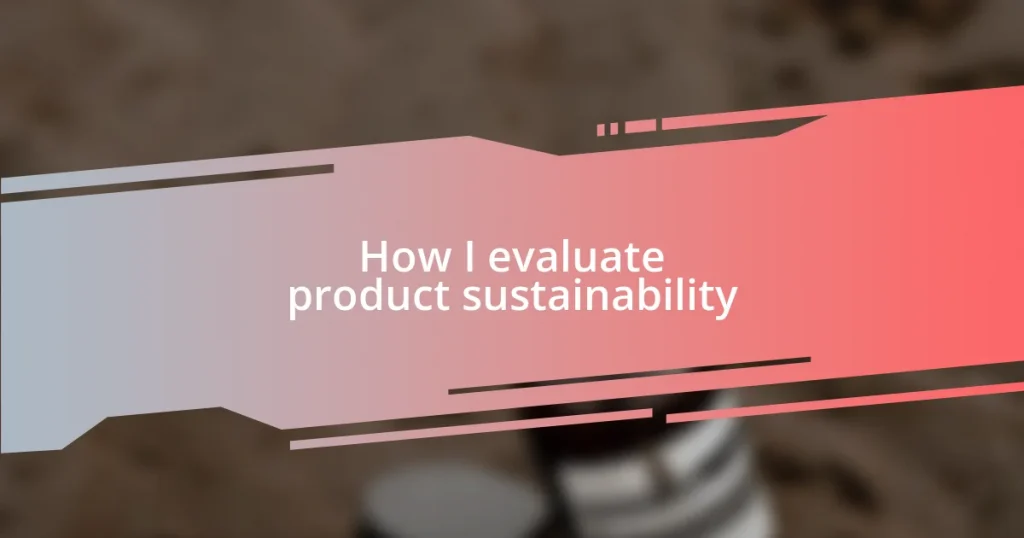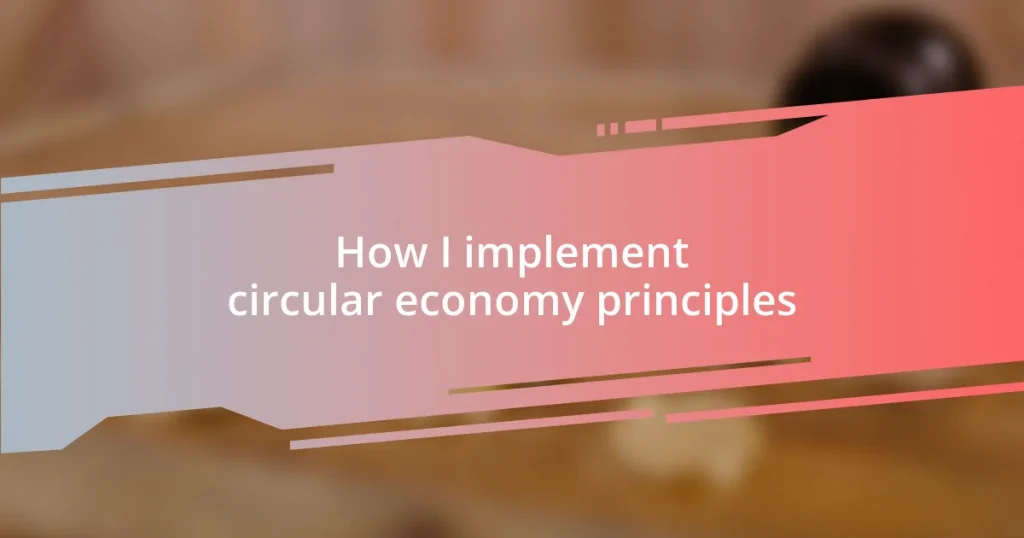Key takeaways:
- Understanding digital privacy concepts, such as encryption and data harvesting, empowers individuals to make informed choices about their online information.
- Implementing strong data protection measures, like unique passwords, two-factor authentication, and regular updates, is essential for safeguarding personal information.
- Utilizing privacy tools, including VPNs, privacy-focused browsers, and password managers, can significantly enhance online security and anonymity.

Understanding digital privacy concepts
Understanding digital privacy concepts requires a grasp of key terms and ideas that influence our online lives every day. For instance, when I first encountered the term “encryption,” it sounded complex and intimidating. But I quickly learned it’s simply a method of scrambling data so that only authorized users can read it. This revelation opened my eyes to just how many layers there are to protecting my information online.
Privacy settings on social media platforms often feel like a maze. I remember the frustration of trying to navigate those settings after reading a news article about privacy breaches. It made me question just how much control I truly have over my personal information. Have you felt that sense of vulnerability too? Once I took the time to explore and understand these settings, I realized that while I may never have complete control over my data, being informed empowers me to make better choices.
Data harvesting is another critical concept that can be both fascinating and alarming. It was a real wake-up call for me when I started noticing targeted ads popping up based on my recent searches. How did they know? This experience made me think about the fine line between convenience and privacy. Understanding that my data is constantly collected and analyzed has prompted me to adjust my online behaviors, urging me to prioritize my privacy while navigating the digital landscape.

Importance of data protection measures
Data protection measures are crucial in safeguarding our personal information from unauthorized access and misuse. I vividly remember the uneasy feeling I had after reading about a major data breach affecting millions of users. It was a stark reminder that, without proper security measures, my data could easily fall into the wrong hands. Practicing good data protection not only builds trust with service providers but also fosters a sense of safety for me as a user.
Here are some essential data protection measures to consider:
- Use Strong, Unique Passwords: I’ve learned the hard way that reusing passwords across accounts is a recipe for disaster. Having unique, complex passwords makes it tough for hackers to gain access.
- Enable Two-Factor Authentication (2FA): Adding an extra layer of security has become a non-negotiable for me. 2FA might feel like an extra step, but it drastically reduces the risk of unauthorized access.
- Regular Software Updates: I always prioritize keeping my devices updated. It’s easy to overlook, but updates often include patches for security vulnerabilities that hackers exploit.
- Be Cautious with Public Wi-Fi: I’ve had my share of moments in cafes, blissfully browsing on public networks without a thought. After a friend shared a horror story, I now make it a rule to avoid sensitive transactions on unsecured Wi-Fi.
- Limit Data Sharing: More than ever, I consciously choose what information I share online. When signing up for services, I often think twice about fields that aren’t necessary, realizing that less data means less risk.

Tools for enhancing online privacy
There are a variety of tools available that can significantly enhance your online privacy. A VPN, or Virtual Private Network, is one of my favorites; it effectively masks your IP address, making it harder for third parties to track your online activity. I still remember the first time I used one while traveling—suddenly, I felt like my internet connection was secure, even on public networks. It was a relief knowing that my data was less exposed.
Using privacy-focused browsers like Brave has transformed my browsing experience. I initially felt skeptical about switching from mainstream browsers, but once I saw how much ad tracking and data collection was blocked, I was hooked. The sense of control I gained over my browsing habits was liberating. It’s a small change that made a huge impact on my online interactions.
Another essential tool is password managers, which store and generate complex passwords for your accounts. I can’t emphasize enough how much my life changed after I started using one! No more struggling to remember various passwords or the anxiety of reusing them. It’s a great feeling to know that my online accounts are secure without having to compromise my memory.
| Tool | Description |
|---|---|
| VPN | Secures your internet connection and hides your IP address. |
| Privacy-Focused Browsers | Blocks trackers and ads for a safer browsing experience. |
| Password Manager | Stores and generates strong passwords for your accounts. |

Effective password management strategies
When it comes to managing passwords, I’ve discovered that simplicity paired with security is key. I remember the frustration of forgetting a complex password and the panic that followed when I struggled to regain access. That’s when I started using a password manager to securely store and generate unique passwords for each account. It’s like having a digital vault that keeps my passwords safe while sparing me the headache of remembering them all.
One strategy that’s worked wonders for me is creating a password phrase. Instead of a jumble of letters and numbers, I use a memorable sentence complete with spaces and special characters. Not only does it make me feel like a secret agent, but it’s also a technique that’s tough for hackers to crack while still being easy for me to recall. Has anyone else felt that rush when they finally nail down a password that’s secure yet meaningful? It’s both empowering and reassuring at the same time.
Lastly, I can’t stress enough the importance of regular password updates. There was a time when I thought changing passwords was unnecessary until I learned about continuing data breaches. The idea of freshening up my passwords periodically gave me a newfound peace of mind. I established a personal schedule, like updating them every six months, which now feels like a healthy routine. It’s such a simple act, but it turns into this powerful habit that dramatically enhances my digital security. Wouldn’t you feel more secure knowing you’re staying one step ahead?

Leveraging VPNs for anonymity
When I first started using a VPN, it felt like gaining a secret passageway into a world where my digital footprint was just a shadow. On a recent online shopping spree, I toggled on my VPN, and suddenly I was in a different country, browsing with a sense of liberation. Have you ever felt that thrill of anonymity? It’s like donning an invisibility cloak, knowing that your activity is tucked away from prying eyes.
Navigating the web can be nerve-wracking, especially with stories about data breaches and surveillance. I vividly recall a time when I found a free Wi-Fi connection at a café, which terrified me because I knew how easy it was for others to snoop on my actions. Activating my VPN transformed that anxiety into confidence. I realized I could protect my sensitive information, and that small click made a world of difference.
It’s important to recognize that not all VPNs are created equal. I learned this the hard way after choosing a service that fell short on speed and reliability. The frustration of buffering videos while trying to stream my favorite series was unbearable! By switching to a reputable provider, I finally enjoyed smooth internet access while keeping my anonymity intact. When selecting a VPN, think about what you really value—speed, security, or customer support—and don’t hesitate to prioritize what matters most to you.

Best practices for safe browsing
When it comes to safe browsing, one of the best practices I’ve adopted is using a trusted browser extension for content filtering. I remember the first time I encountered a sketchy website—I was immediately on guard. Installing an extension that blocks ads and pop-ups not only enhances my experience but also adds a solid layer of protection against malicious sites. Have you ever clicked on an ad, only to regret it later? I certainly have, and that’s what motivated me to take charge.
Another habit I’ve embraced is double-checking URLs before clicking. There was one instance when a friend sent me a link that looked enticing, but I paused—something felt off. It turned out to be a phishing attempt! Since then, I’ve become that person who hovers over links to see where they lead. This practice feels empowering; it’s that little moment of vigilance that can save you from potential headaches down the line.
Lastly, I firmly believe in the importance of clearing cookies and browser history regularly. Initially, I thought this was just a formality until I learned how much information those tiny files could store. With a quick visit to my browser’s settings, I can wipe the slate clean, giving myself a fresh start each time I browse. Doesn’t it feel liberating to know you’re taking control of your data? That small action reassures me that I’m safeguarding my privacy, making my online sessions feel much safer.

Regularly reviewing privacy settings
Regularly checking my privacy settings has become an integral part of my online routine. I still remember the moment I discovered how many apps had access to my camera and microphone. It was unsettling! I couldn’t believe I had overlooked those permissions for so long. Now, every few weeks, I sit down and go through my settings, like a digital cleanse. It’s astonishing how many apps can accumulate unnecessary access without us even realizing it.
What’s really eye-opening is seeing the changes in privacy regulations and policies across platforms. When a social media giant updated its privacy settings, I made it a point to review my choices. It was like peeling back layers to reveal the reality of my data. I found out I had been sharing way more than I intended! Have you ever experienced that moment of realization, where you feel exposed? It truly motivates me to stay vigilant and proactive about my privacy.
I also encourage friends and family to make this a monthly habit. When I’m discussing these topics over coffee, I often ask them how often they check their settings. The puzzled expressions I see are a reminder that this is something we often overlook, yet it can dramatically affect our online security. By sharing my journey towards more conscious digital living, I hope to inspire others to make it a priority, too. What steps are you taking to ensure your privacy is respected?















